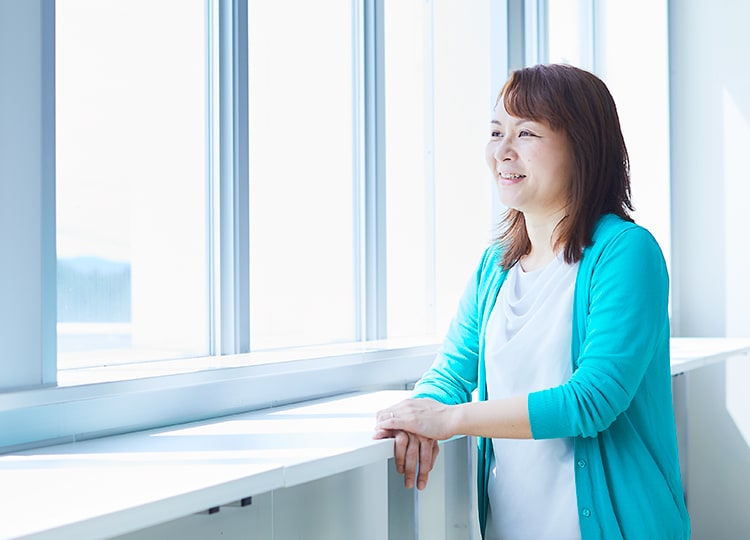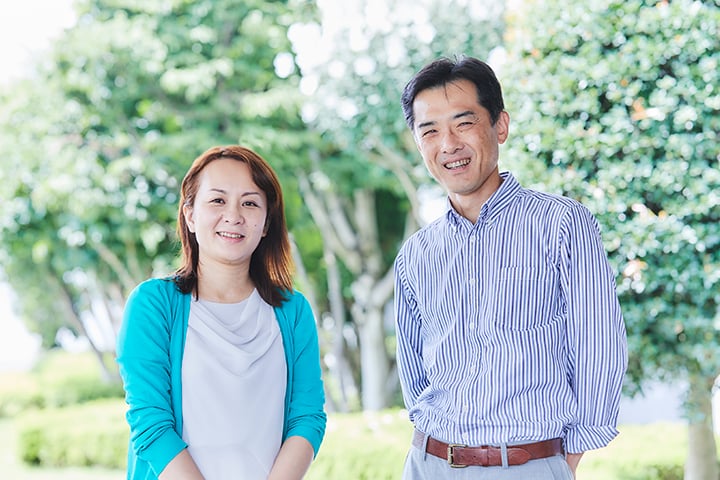PEOPLE


Balancing family caregiving and work to ensure a better life
Reiko Sugawara
Sony Semiconductor Manufacturing Corporation Process Engineering Div.
While striving to care for her family, Reiko Sugawara is using her skills and experience from her days
as an engineer to provide support services for engineers.
We asked Ms. Sugawara together with her manager, Masaharu Takeda,
how she manages to balance work and nursing care on a daily basis, and about the key points for doing so successfully.
Making use of available company schemes to
continue working while taking care of three family members
Sugawara: I started caring for my family while working because my child had a congenital illness. He needed surgery immediately after birth, but it was completely successful, and everything went well subsequently. I was able to return to work within the childcare leave period and was getting back on track when our house burned down, forcing me to take leave of absence again. I set about rebuilding my life and managed to go back to work, but my child's illness returned. I took caregiver leave because my family's surgery and caregiving were necessary. Around the same time my father-in-law fell ill from stress and since my mother-in-law had a chronic illness, I ended up having to care for three people simultaneously. Since my child could not attend nursery school because of the need for medical care, I was unable to return to work when the leave period ended. Thanks to the efforts of the hospital doctors and nurses, I was eventually able to leave my child in the care of a nursery school. This enabled me to return to work using the company's reduced working hours scheme for nursing care, which allows me to work four hours a day.
Now that both my child and my father-in-law have recovered to the extent that they can live normal lives, my main focus is on caring for my mother-in-law. Daily care requires thirty minutes to an hour for breakfast, lunch, and dinner, while about an hour of treatment is also needed on some days. Caregiving can be a matter of life and death and, together with not being able to do what I want, has become an emotional burden. It was especially hard for me to give my mother-in-law injections, but recently my husband has been helping me. Hospital visits are also difficult because there is more than one place to go to, but my father-in-law and my husband help me out. I came close to losing heart on many occasions in my life as a caregiver, but with the help of the company's schemes and my colleagues, I have been able to keep going.

Using engineering experience and knowledge to support other engineers
Sugawara: After I joined the company I worked as a semiconductor wet process engineer using liquid chemicals to clean materials. However, when I had to take care of three people at home simultaneously, I asked to be transferred to other roles in my current department because I could not devote enough time to my work. Currently, I am in charge of supporting multiple engineers and coordinating projects within the department utilizing the knowledge and experience I gained as an engineer. Unlike the work of engineers, who basically work individually and whose results can be expressed numerically, support work is demanding because it requires flexible responses depending on the circumstances, but I find it rewarding. When I hear that the work of the engineers I deal with has gone smoothly and their technical issues have been resolved, I feel as happy as if I have achieved this myself
Takeda: Ms. Sugawara is not a so-called manufacturing process development assistant but is responsible for working together with engineers on quality control and prototype progress management. She is involved in improving the work of all engineers by planning and promoting projects to improve quality and work efficiency. My impression is that she is an excellent supporter for engineers because she understands both the nature of their work and how they feel. She is a bit like a good trainer of a high school baseball team, who knows the feelings of all the players and works with them to come up with training plans. I think her ability to deliver results without compromise despite the difficulties she faces in balancing work with nursing care demonstrates the sense of responsibility towards work she developed as an engineer.
 Ms. Sugawara's supervisor, Masaharu Takeda, General Manager
Ms. Sugawara's supervisor, Masaharu Takeda, General ManagerA workplace where it is possible to discuss anything with coworkers and
supervisors while encouraging a good life/work balance
Sugawara: When I had to start balancing work with nursing care, I had absolutely no sense that I was prohibited from talking about my caregiving concern in my workplace, and I was able to explain and discuss my situation openly. I am fortunate to work in an environment where I can speak about anything to coworkers and supervisors who are always helpful and supportive. I also remember that when I had to step away from my engineering work, I was comforted by the warm words of my colleagues and supervisors, who told me that I could always come back at any time.
Takeda: When I was assigned to manage Ms. Sugawara in this department, I wondered at first if she really wanted me to reduce her workload because she was not in a position to work full time. As she was originally a process engineer, I wondered whether reducing her workload significantly would also reduce her motivation, perhaps changing her feelings about contributing to the company as much as possible. After listening carefully to her wishes and firmly grasping her intentions, I assigned her to tasks that would contribute to the company while taking into consideration the weight of her work and responsibilities.
Sugawara: To balance nursing care and work, I took advantage of all available company schemes, including caregiver leave, the four hours a day reduced working hour scheme, and life vacations. As I was determined not to quit my job, I consulted with HR and asked them to look into all available schemes. On my own, I would not have known what to do and might have abandoned the idea of balancing work and caregiving altogether. I am still using the childcare and nursing care support such as working from home and using annual paid leave on an hourly basis. Since I need to provide care in the morning, afternoon, and evening, schemes that allow me to use my time flexibly during the day and take advantage of work breaks are extremely helpful.

- *This scheme is available at Sony Semiconductor Manufacturing Corporation. Availability varies from company to company.
Your own health is vitally important for caregiving
Sugawara: In balancing caregiving and work, I do everything possible to complete the tasks I am asked to do at work in good faith in order to win the cooperation of people in my workplace and others around me. To earn my colleagues' trust, I always try to avoid using caregiving as an easy excuse to turn down requests. There are times when it is just not possible, but once I accept something I find ways to accomplish it. It is also vital to avoid being a perfectionist when it comes to caregiving. Initially, I adopted an idealistic attitude, but sometimes things became tough, and I ended up lashing out at my family. Now I feel much better because I find ways to make things easier for myself while doing the best I can.
To ensure I can continue to take care of my family, it is vital to keep myself healthy, both physically and mentally. Above all, I must avoid stress. To relieve stress, I use short-stay and home-visit nursing services to make time for myself, and enjoy playing basketball, which I love, and go fishing with my children.

 From a company event in 2017. It was wonderful to see the children smile so happily after the illness recurred and all the surgeries succeeded. Our family truly enjoyed picking cherries a local specialty of Yamagata, Japan.
From a company event in 2017. It was wonderful to see the children smile so happily after the illness recurred and all the surgeries succeeded. Our family truly enjoyed picking cherries a local specialty of Yamagata, Japan. Vital to talk to someone about caregiving concerns, not keep them to yourself
Sugawara: Although I faced tough times with regard to caregiving when things piled up, quitting my job was not an option. While there are economic reasons, such as the cost of caring for my children and my future, I continue to work primarily because I want to confirm the meaning of my existence in an environment where I can feel connected to society. Since caregiving is something we do for others, I gradually fell into a mindset where I felt Ii was sacrificing myself and sometimes wondered what I was living for. If you can no longer feel that your life is your own, I believe your life along with a caregiving has reached a dead end. For me, my time at work is important because it enables me to realize my life is mine to live.
Life along with a caregiving can be lonely and it becomes difficult to escape from negative thoughts. Many caregivers have problems and unless they talk to someone they may find they are locked into a negative mindset. In my case, I was very fortunate to have colleagues, supervisors, and medical professionals with whom I could talk about anything. Since I became a caregiver while working, I am surprised to find I have had more opportunities to meet people with similar problems. Talking about my problems helps me gain courage and energy because I feel I am not alone. I want to tell people who are currently struggling with caregiving problems that they are never alone. If you have caregiving concerns, please talk to someone, do not keep them to yourself.

- *Sony provides a wide range of information to help employees balance work and life events, including nursing care, through its intranet and other employee tools. This information includes tips for better communication in the workplace and with the family, tips for creating an environment that facilitates a good life/work balance, and how to take advantage of company schemes.


